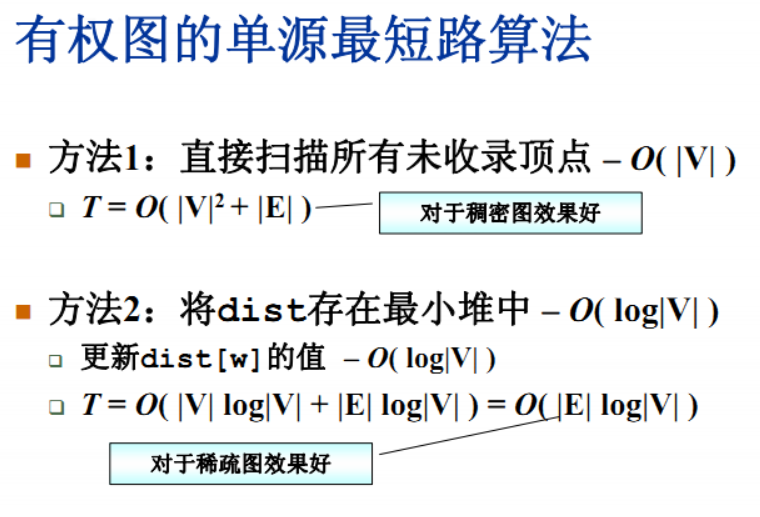圖 之 Dijkstra演算法(附帶習題程式碼)
阿新 • • 發佈:2019-02-10
定義概覽
Dijkstra(迪傑斯特拉)演算法是典型的單源最短路徑演算法,用於計算一個節點到其他所有節點的最短路徑。主要特點是以起始點為中心向外層層擴充套件,直到擴充套件到終點為止。注意該演算法要求圖中不存在負權邊。
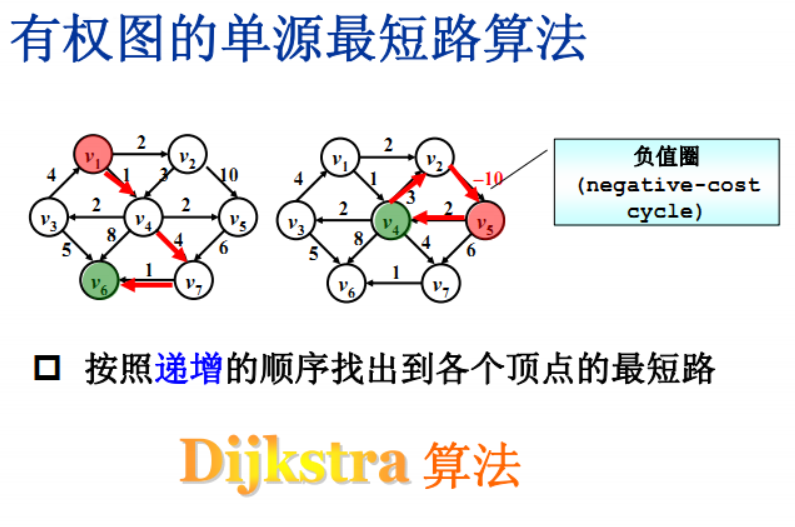
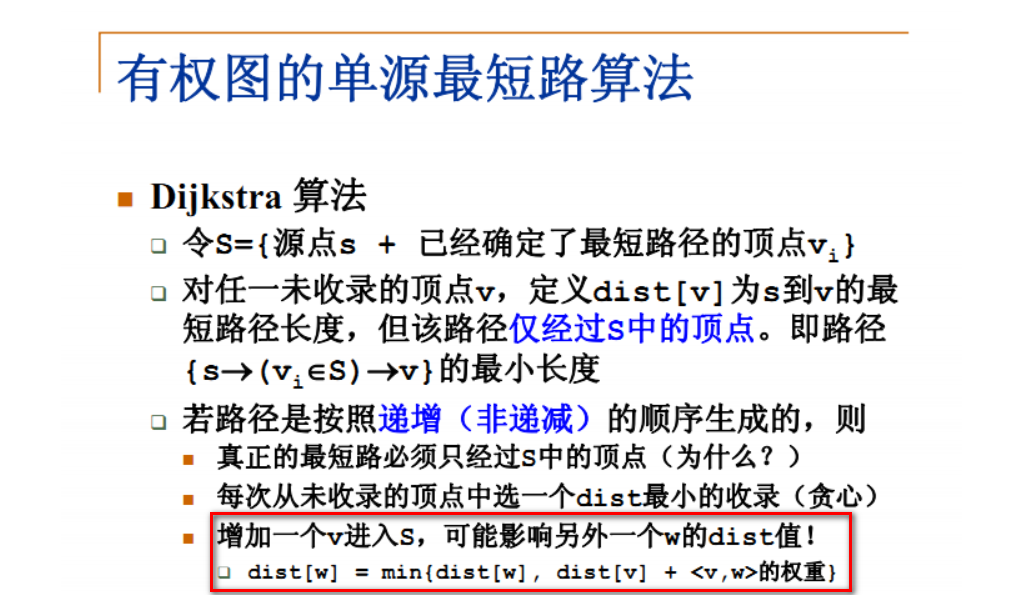
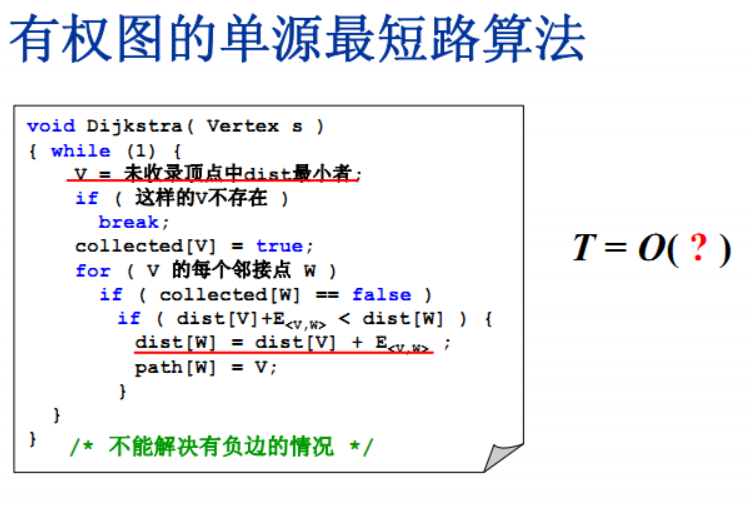
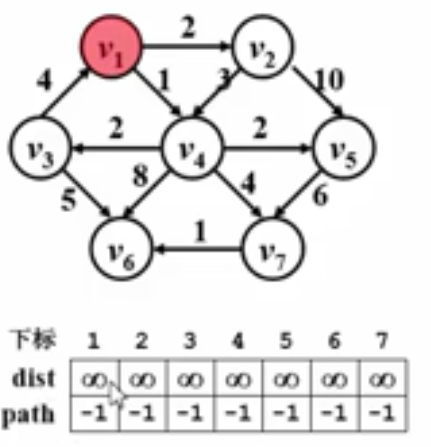
我的理解
從開始頂點出發,先將開始頂點吃入(即標記已訪問)
1。找其最短的邊所連的頂點
2。將其吃入(即標記已訪問)
3。遍歷與其相連的其他頂點
4。若從V 到W距離小於之前到W的距離,則修改(更新)
5。可以用個堆疊來儲存路徑
6。迴圈1~4 更新距離, 直至所有的頂點都已經吃入
(1)dist 表示從這個點(陣列序號)到原點的最短距離,每次也更新這裡
(2)path 用來表示路徑
(3)注意:第一次是要把入口頂點所在的邊吃入先——–這步初始化別忘了
/* 鄰接矩陣儲存 - 有權圖的單源最短路演算法 */
Vertex FindMinDist( MGraph Graph, int dist[], int collected[] )
{ /* 返回未被收錄頂點中dist最小者 */
Vertex MinV, V;
int MinDist = INFINITY;
for (V=0; V<Graph->Nv; V++) {
if 坑點:
高速公路是雙方向的。一開始我以為是單方向的,然後就只過了一個用例。第一次練這題,所以有點囉嗦,請見諒!
//07-圖6 旅遊規劃 (25分)
#include<cstdio>
using namespace std;
#define MAXN 505
#define INFINITY 505
struct City{
int len;
int fees;
};
int N; //城市的個數 編號 0 ~ (N - 1)
int M; //高速公路的條數
int S; //出發地的城市編號
int D; //目的城市編號
City city[MAXN][MAXN]; //圖
int flag[MAXN]; //標記
City dist[MAXN]; //dist表示 這個點到原點的最短路徑
int Length; //路徑長度
int Fees; //收費額
void init(){
for(int i = 0; i < N; ++i){
for(int j = 0; j < N; ++j){
city[i][j].len = INFINITY;
city[i][j].fees = INFINITY;
}
}
for(int i = 0; i < N; ++i){
dist[i].len = INFINITY;
dist[i].fees = INFINITY;
}
}
void setDistValue(int s, int i, int j){
dist[S].len = i;
dist[S].fees = j;
}
int findMinDist(){
City minDist;
minDist.fees = INFINITY;
minDist.len = INFINITY;
int V; //用於返回的頂點
for(int i = 0; i < N; ++i){
if(flag[i] == 0){
if(dist[i].len < minDist.len){
minDist.len = dist[i].len;
minDist.fees = dist[i].fees;
V = i;
}else if(dist[i].len == minDist.len){
if(dist[i].fees < minDist.fees)
minDist.fees = dist[i].fees;
}
}
}
if(minDist.len < INFINITY)
return V; //返回對應的頂點下標
else return -1; //這樣的頂點不存在,返回錯誤標記
}
void dijkstra(){
setDistValue(S, 0, 0); //將起點吃入集合
flag[S] = 1; //標記
for(int i = 0 ;i < N; ++i){
dist[i].len = city[S][i].len;
dist[i].fees = city[S][i].fees;
}
int V; //用來表示頂點下標
while(1){
V = findMinDist();
if(V == -1) //這樣結點不存在
break;
flag[V] = 1; //吃入
for(int i = 0; i < N; ++i){ //對圖中的每個頂點
if(flag[i] == 0 && city[V][i].len < INFINITY){ // W是V的鄰邊且未被吃入
if(city[V][i].len < 0) //為負邊
return ; //不能正確處理,返回錯誤標記
if(dist[V].len + city[V][i].len < dist[i].len){ //吃入V使得dist[i]變小
dist[i].len = dist[V].len + city[V][i].len;
dist[i].fees = dist[V].fees + city[V][i].fees;
}else if(dist[V].len + city[V][i].len == dist[i].len){ //吃入V等於dist[i]
if(dist[V].fees + city[V][i].fees < dist[i].fees) //路費比其少則更新
dist[i].fees = dist[V].fees + city[V][i].fees;
}
}
}
}
}
int main(void){
scanf("%d%d%d%d", &N, &M, &S, &D);
init(); //初始化
int beginCity;
int endCity;
int len;
int fees;
for(int i = 0; i < M; ++i){
scanf("%d%d%d%d", &beginCity, &endCity, &len, &fees);
city[beginCity][endCity].len = len;
city[beginCity][endCity].fees = fees;
city[endCity][beginCity].len = len;
city[endCity][beginCity].fees = fees;
}
dijkstra();
// for(int i = 0 ; i < N; ++i)
// printf("i=%d len=%d fees=%d\n", i, dist[i].len, dist[i].fees);
printf("%d %d", dist[D].len, dist[D].fees);
return 0;
}
